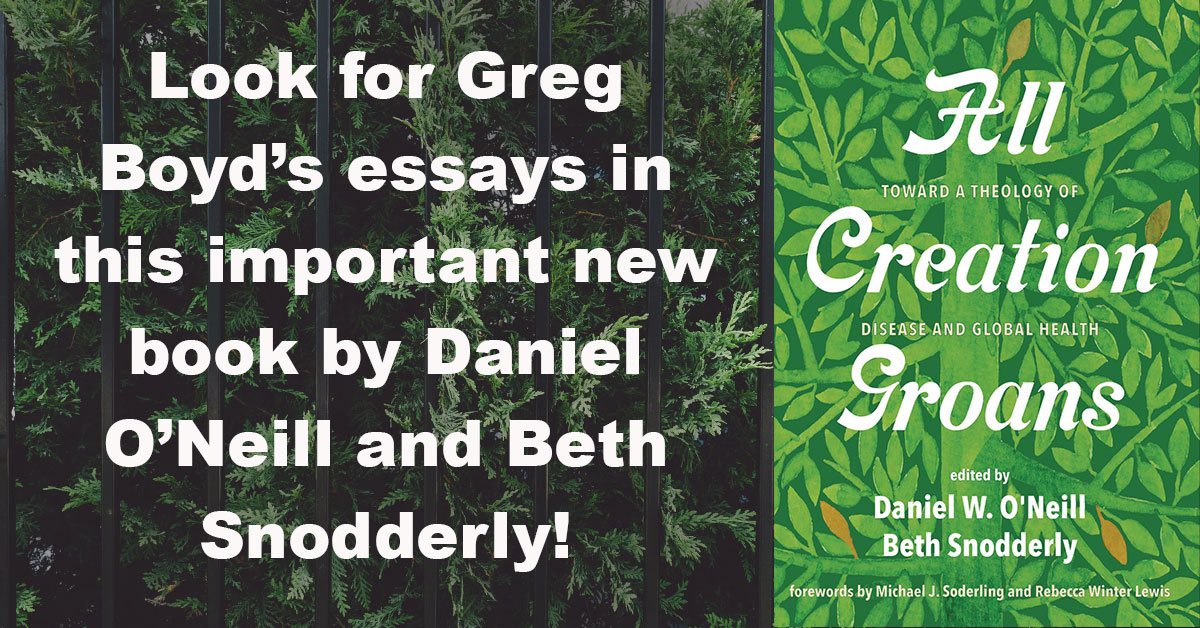We run our website the way we wished the whole internet worked: we provide high quality original content with no ads. We are funded solely by your direct support. Please consider supporting this project.
All Creation Groans (podcast)
Greg talks about a great new book called “All Creation Groans.”
.
TRANSCRIPTION:
Dan Kent: Greg! Good morning!
Greg Boyd: Good morning to you too!
Dan: I heard that you contributed to a book that’s very intriguing to me. And I know it is for Barbara also. Barbara and I are really into creation care, and we care about animals, and all that kind of, you know, leftie, softie heart, bleeding heart stuff. That’s awesome. We like, even if it’s squirrels, or turtles, or whatever, we care about that stuff. And you’re contributing to a book called All Creation Groans, which sounds like it’s in the spirit of creation care. What is this?
Greg: Well, it’s a remarkable collection of writings that just was published, I think last week. It’s edited by Daniel O’Neill and Beth Snodderly. Beth has been a friend of mine for about 15 years and she first introduced me to Ralph Winter. The basic thesis of this collection of essays is that caring about creation and caring about human health and human flourishing is part of the mission of the church. And so part of the mission of the church should be investigating the origin of diseases and looking at ways of eradicating diseases. That’s as much a part of missions as bringing the gospel to a foreign land.
And so, in this collection of essays, it’s written by some theologians, by some health experts, pandemic experts, people who are interested in diseases and whatever. And the basic thesis is that the creation as it now is, is not identical to the creation that God had always intended. “All creation groans” comes from Romans 8, and there’s this pain that permeates the creation. It’s been subject to futility, Paul says in Romans 8. Frustration to death and decay, as we see all around us. So the thesis is that based on the ministry of Jesus, we assume that sickness and disease, death, and those kinds of infirmities, are not reflective of God’s will. So they’re reflective of something going wrong in creation. I call it the “corruption of creation hypothesis.” I’ve got two essays in here, talking about natural evil and answering some objections like that. So you have a multiplicity of diverse perspectives. They did a great job of bringing in a lot of diversity. It’s an interesting collection of essays.
Now any time you have a collection of essays around one topic, you’re going to have some redundancy. There’s no way to avoid that. So you do have some redundancy and repetition here. But it’s all good. I encourage folks to look at this. Especially because this is a thesis that’s not taken that seriously by the majority of contemporary theologians, and I think that’s so unfortunate. Once you accept that there could be agents that are corrupting the creation, and that the creation is not just God’s wonderful, ideal—that God planned all this animal suffering and stuff. Once you’ve accepted that kind of framework, a lot of things just kind of fall into place. Not just a regular view of the creation and our call to care about creation, and our call to be behind human flourishing, and try to eradicate diseases. But it also affects your view of the character of God, and what atonement’s all about, all of that. So I encourage folks to check out the book.
Dan: That’s right in my wheelhouse. I love that whole topic. That sounds intriguing.
Greg: All Creation Groans, edited by Beth Snodderly and Daniel O’Neill. Get it and start today. Supplies limited. Call now.
[Laughter]
Dan: That’s awesome!

Send Questions To:
Dan: @thatdankent
Email: askgregboyd@gmail.com
Twitter: @reKnewOrg
Greg’s new book: Inspired Imperfection
Dan’s new book: Confident Humility
Subscribe:
Category: ReKnew Podcast



